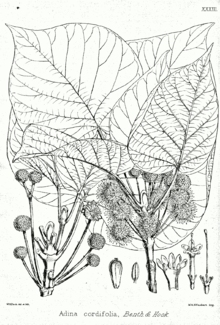Haldina
| Kadam | |
|---|---|
 | |
| Haldina cordifolia | |
| Scientific classification | |
| Kingdom: | Plantae |
| (unranked): | Angiosperms |
| (unranked): | Eudicots |
| (unranked): | Asterids |
| Order: | Gentianales |
| Family: | Rubiaceae |
| Genus: | Haldina Ridsdale |
| Species: | H. cordifolia |
| Binomial name | |
| Haldina cordifolia (Roxb.) Ridsdale | |
| Synonyms | |
|
Adina cordifolia (Roxb.) Benth. & Hook.f. ex B.D.Jacks. | |
Haldina cordifolia,[2][3] syn. Adina cordifolia, is a flowering plant in the family Rubiaceae, the sole species in the genus Haldina. It is native to southern Asia, from India east to Yunnan and Vietnam and south to Peninsular Malaysia. It is known as Kadam or Kadamba in Hindi and Gáo trò in Vietnamese.
Haldina cordifolia is a deciduous tree that can grow well over 20 metres high. The flowers may be insignificant individually but can be seen as attractive when they bloom together in inflorescences with a circumference of 20–30 mm. They are usually yellow often tinged with a shade of pink. H. cordifolia usually blossoms during winter (dry season) months. The bark of the tree acts as an antiseptic.
_in_Ananthagiri_forest%2C_AP_W_IMG_9370.jpg)
_in_Ananthagiri_forest%2C_AP_W_IMG_9369.jpg)
_in_Ananthagiri_forest%2C_AP_W_IMG_9367.jpg)
_in_Ananthagiri_forest%2C_AP_W_IMG_9366.jpg)
 Trunk at Udawatta Kele Sanctuary, Sri Lanka
Trunk at Udawatta Kele Sanctuary, Sri Lanka Trunk at Udawatta Kele Sanctuary, Sri Lanka
Trunk at Udawatta Kele Sanctuary, Sri Lanka
References
- ↑ The Plant List
- ↑ Ridsdale, 1978 Blumea 24: 361
- ↑ "Haldina cordifolia". Germplasm Resources Information Network (GRIN). Agricultural Research Service (ARS), United States Department of Agriculture (USDA). Retrieved 4 January 2018.
External links
| Wikimedia Commons has media related to Haldina cordifolia. |
| Wikispecies has information related to Haldina cordifolia |